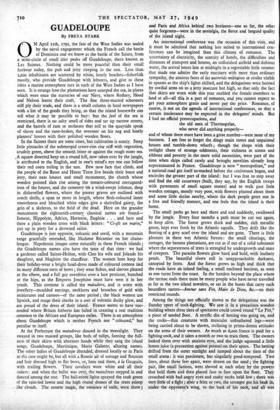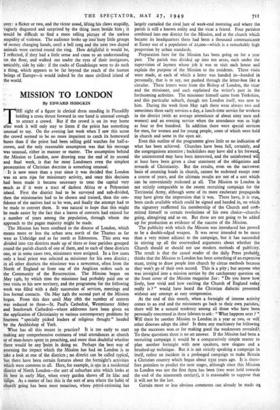GUADELOUPE
By FREYA STARK
N April 11th, 1792, the fate of the West Indies was sealed by the naval engagement which the French call the battle of Dominica and we know as the battle of the Saints, from a semi-circle of small islet peaks off Guadeloupe, there known as Les Saintes. Nothing could be more peaceful than their small harbour today, the pub and jetty sleeping in the sun. Less than 2,000 inhabitants are scattered by white, lonely beachesfisherfolk mostly, who provide Guadeloupe with lobsters, and give to these islets a marine atmosphere rare in such of the West Indies as I have seen. It is strange how the plantations have usurped the sea, in places which were once the nurseries of our Nitvy, where Rodney, Hood and Nelson learnt their craft. The fine three-masted schooners still ply their trade, and there is a small column in local newspapers with a list of the goods they bring, so that the island housewife can tell what it may be possible to buy : but the feel of the sea is restricted, there is no salty smell of tides and tar up narrow streets, and the barrels of rum or molasses that roll to the quayside speak of slaves and the cane-brakes, the overseer on his nag and lonely planters' houses with their polished wooden floors.
In the Saintes there are some vines, but cultivation is scanty. Steep little pinnacles of the submerged crater-rim rise stiff with vegetation, crudely green, above the smooth inner or against the rough outer sea. _A square deserted keep on a round hill, now taken over by the jungle, is attributed to the English, and in one's mind's eye one can 'follow their red coats toiling in the sun. Few now face that climb, and the people of the Basse and Haute Terre live beside their boats and jetty, their neat houses and small monument, the church whose wooden pointed slats rise among the tomato-coloured corrugated- iron of the houses, and the cemetery on a wind-swept isthmus, deep in dishevelled flowers, where the poorer graves are outlined with conch shells, a span or more in length, whose flesh-coloured inner smoothness and bleached white edges give a shrivelled gaiety, the grin of a skeleton, to the field of the dead. Here on the grander monuments the eighteenth-century classical names are found- Ismene, Hippolyte, Adrien, Hortense, Eugenie . . . and here and there a plain wooden cross with black letters : "Ci-git un marin," put up in piety for a drowned sailor.
Guadeloupe is just opposite, volcanic and coral, with a mountain range gracefully extended, like Madame Recamier on her chaise- longue. Napoleonic images come naturally in these French islands ; the Guadeloupe names also have the taste of that time: we had a gardener called Sainte-Helene, with Cleo his wife and Jolande his daughter, and Magloire the chauffeur. The women here keep for their holiday-wear a bright head-dress made of coloured cottons tied in many different sorts of bows ; they wear fichus, and sleeves pleated at the elbow, and a full gay overdress over a lace petticoat, bunched at the hips, as the Empress Josephine must have seen it in her youth. This costume is called the matadore, and is worn with jewellery—moulded earrings, necklaces and brooches of gold with miniatures and cameos—of the same period ; the black women use lipstick, and rouge their cheeks to a sort of volcanic dusky glow, and are proud of the dress of their island. France seems to have sue., ceeded where Britain hitherto has failed in creating a real tradition common to the African and European exiles. There is an atmosphere about Guadeloupe which is neither French nor " coloured," but peculiar to itself.
At the Prefecture the matcvdores danced in the moonlight. They swayed in two massed groups, like beds of tulips, fanning the full- ness of their skirts with alternate hands while they sang the island songs, Guadeloupe, Martinique, Marie Galante, alluring names. The other ladies of Guadeloupe attended, dressed locally or in Paris as the case might be, but all with a Renoir air of corsage and flounces and hair dressed high to flat bows, or, here and there, a la Gauguin, with trailing flowers. Their cavaliers wore white and all their orders : and when the ballet was over, the mata.dores stepped in and danced among the rest. The ball-room lights sprayed the rank green of the rain-fed lawns and the high round domes of the trees asleep like clouds. The remote magic, the romance of exile, were there ;
and Paris and Africa behind two horizons—one so far, the other quite forgotten—were in the nostalgia, the fierce and languid quality of the island night.
An international conference was the occasion of this visit, and it must be admitted that nothing less suited to international con- ferences can be imagined than this climate of romance. The uncertainty of electricity, the scarcity of hotels, the difficulties and distances of transport and houses, an unfinished airfield and dubious water, the arrival hours late at midnight in a regrettable little steamer that made one admire the early mariners with more than ordinary sympathy, the anxious faces of les autorites militaires et civiles visible in spasms as the ship's lights shifted, and the delegations were hoisted by cordial arms on to a jetty insecure but high, so that only the fact that skirts are worn wide this year enabled the female members to land at this is a part of romance, and you cannot expect to get your atmosphere gratis and never pay the price. Romance, of course, is not on the agenda of international conferences, so that a certain intolerance may be expected in the delegates' minds. But I had no official preoccupations, and the old men of Thermopylae,
who never did anything properly—
and of whom there must have been a great number—were none of my business. I am free to forget the dingy main street and unpainted houses and tumble-down wharfs ; though the shops with their twilight chaos of strange oddments, their richness in scents and ribbons and poverty in the more solid necessities, were part of the time when ships called rarely and brought novelties already long superannuated in France. Guadeloupe is now " metropolitan," and a national road got itself tarmacked before the conference began, and encircles the greater part of the island : but I was free to step away and find the old causeways (built, they say, by the English troops with pavements of small square stones) and to walk past little wooden cottages, mostly very poor, with flowers planted about them and some little shrine nearby, where the dark people greet one in a free and friendly manner, and one feels that the island is their home.
The small paths go here and there and end suddenly, swallowed by the jungle. Every four months a path must be cut out again, to keep alive. The forest grows thick and sodden, rich metallic green, kept ever fresh by the Atlantic squalls. They drift like the floating of a grey scarf over the island and are gone. There is little pleasure in these wet Atlantic forests : the small clearings, the cottages, the banana plantations, are cut as if out of a solid substance where the separateness of trees is strangled by undergrowth and mats of creepers. The parasite flowers glow hard and bold, with leathery petals. The beautiful rivers roll in unapproachable darkness, canopied by ferns. And the forest grows so high and thick that the roads have an inland feeling, a small enclosed horizon, as soon as one turns from the coast. In the hamlets beyond the place where the tarmac ends there must be many people who have never travelled as far as the two island townlets, or sat in the buses that carry such boundless names—Amour sans Fin, Main de Dieu, &c.—on their restricted rounds.
Among the things not officially shown to the delegations was the Sunday sport of cock-fighting. We saw it in-a precarious wooden building where three tiers of spectators could crowd round " Le Pitt," a piece of sanded floor. A terrific din of betting was going on, and the cocks—thin creatures with muscular unfeathered legs—were being carried about to be shown, reclining in prima-donna attitudes on the arms of their owners. As much as 6,000 francs is paid for a fighting cock, and it takes a month or two to train them. The owners looked them over with anxious eyes, and the judge squeezed a little lemon juice (a precaution against poison) on their spurs. The betting- drifted from the outer sunlight and jumped about the tiers of the small arena : it was passionate, but singularly good-tempered. Two lines, about three feet apart, were drawn on the sand ; the fighting pair, like small nations, were shoved at each other by the powers that held them and then placed face to face upon the floor. They crouched with bad angry eyes and snaky necks held- low ; there was very little of a fight ; after a feint or two, the stronger got his beak in, under the opponent's wing, to the back of his neck, and all was over : a flicker or two, and the victor stood, lifting his claws stupidly, vaguely disgusted and surprised by the thing inert beside him ; it would be difficult to find a more telling picture of the useless stupidity of violence. The audience broke up into'busy little groups of money changing hands, until a bell rang and the next two duped animals were carried round the ring. How delightful it would be, I reflected, if they had a little sense and came to an understanding on the floor, and walked out under the eyes of their instigators, amicably, side by side : if the cocks of Guadeloupe were to do such a thing, which appears to be far beyond the reach of the human beings of Europe—it would indeed be the most civilised island of the world.







































 Previous page
Previous page